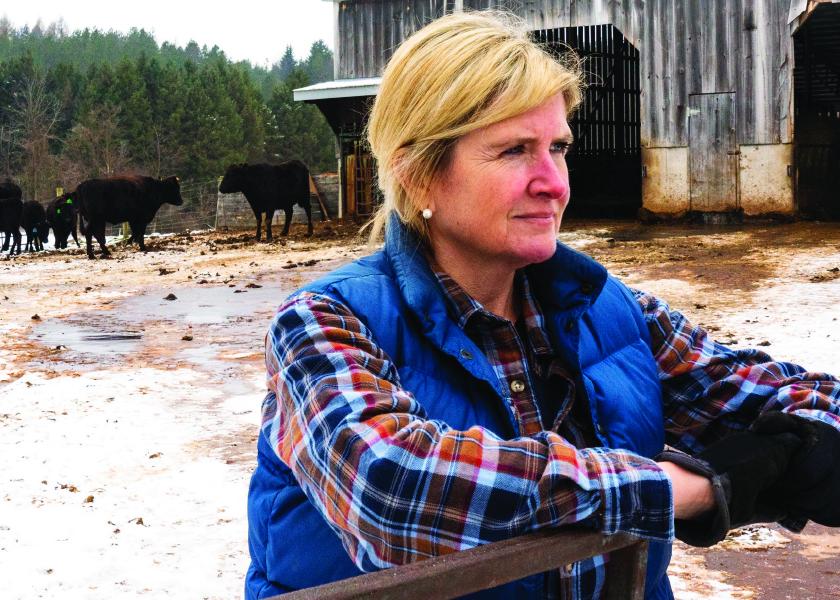Stress Prevention and Treatment: It’s Not Just for Cows

How’s your stress level been lately? That’s an interesting question to answer in the middle of a pandemic. Many veterinarians and producers would likely say it’s a little elevated.
From epidemic illnesses affecting livestock and pets to falling commodity prices to increasing farm debt load, many factors are causing stress among veterinarians and their clients today. Add in a little rural mindset — the idea you can convince yourself to be happy and work yourself out of depression — and it’s a perfect formula for what Athena Diesch-Chham, a clinical veterinary social worker at the University of Minnesota College of Veterinary Medicine, calls a perfect storm for stress and the effects of it.
The Good, the Bad and the Ugly of Stress
Stress is a requirement for life. For humans to be productive, Diesch-Chham says we need a certain level of stress.
“When conditions are right and we are in our zone, we can be incredibly creative and productive. However, at a certain point, when stress is too high, our performance, creativity and problem-solving skills all significantly drop,” she explains in a recent webinar.
From Stress to Burnout
Burnout results from chronic workplace stress that has not been successfully managed, she explains. It often results in feelings of energy depletion or exhaustion, increased mental distance from one’s job or negative feeling toward one’s career and ultimately, reduced professional
productivity.
“One of the biggest challenges with managing burnout is that most work environments do not support slowing down for ‘normal’ things,” Diesch-Chham says. “We know burnout is a thing for just about every profession.”
Unfortunately, if burnout is the cumulative effect of long-term stress, she questions if anyone really recognizes the signs of long-term stress. How often do people push through the burn until they are too far gone?
When people stop asking for help or quickly respond with all requests with “I’ve got it,” she says it’s a sign they are pushing through. Saying no is really hard these days; saying yes is much easier.
“People who are pushing through tend to view time off as less of an option, but this is when it becomes an absolute necessity,” Diesch-Chham says. “We need time off, but we come up with a 1,000 excuses for why we can’t afford to take it.”
When stress accumulates, people tend to engage in activities that don’t align with their morals and ethics, she adds. They cut corners and feel less bad about activities or decisions that would normally make them feel a little off.
More Than Burnout
For decades, compassion fatigue has been talked about in veterinary medicine circles. It’s the emotional response to heavy work for a long time. She says it’s different from burnout because of the emotional component.
Until recently, she thought it made sense for what she saw happening, but she has always struggled with one of the signs of compassion fatigue: apathy, or the loss of the ability to care.
“I don’t believe vets or farmers actually stop caring,” Diesch-Chham explains. “I hypothesize they continue to care, very deeply, to their own detriment.”
So, if it’s not compassion fatigue, what is it?
She says there’s a better term she stumbled into at a training program five years ago that is often tied to war veterans. She believes it’s what many farmers and veterinarians face — moral injury and moral distress.
Moral What?
Moral injury is damage done to a person’s moral and ethical compass when they have to engage in activities that don’t always “line up with their due north,” she explains. Sometimes that means doing things that don’t always feel great but are in the best interest of the herd. When a veterinarian or producer determines an optimal treatment course but is blocked from carrying it out, whether because of money, beliefs or rules, that can result in moral distress.
“When emotional connections are formed, there is a higher level of devastation when the bond is broken,” she says.
Caregiving is both emotionally fulfilling and draining. After all, Mother Theresa required nuns to take an entire year off every four to five years, to allow for them to heal from the effects of their caregiving work, Diesch-Chham says.
“If this worked for the nuns, imagine what it could do for veterinarians and producers,” she says.
The Rock Theory
Humans tend to pick up things they think they need to carry — it can be anything from a side comment from a colleague to an awful interaction with a family member to an unavoidable decision on the farm.
“When we have something that emotionally stung, we tend to pick it up and carry it with us. I call those rocks,” Diesch-Chham explains. “All of a sudden, those rocks get pretty heavy.”
Everyone has a choice about how long they are going to carry around those rocks, she says.
“There is some power in acknowledging that this happened, that it impacted me, that I am potentially changed by what has happened in a situation,” she says. “But also, I can leave it here and I don’t have to carry it with me.”








